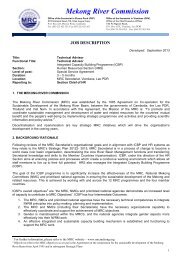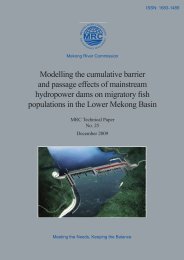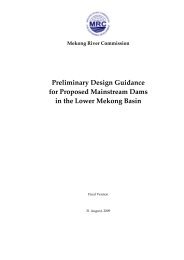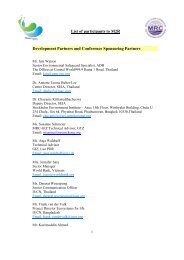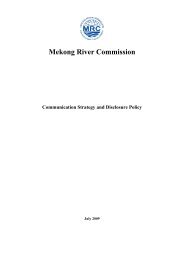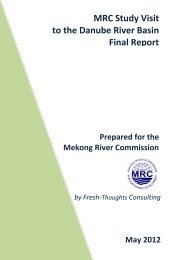Carriage, Handling and Storage of Dangerous Goods along
Carriage, Handling and Storage of Dangerous Goods along
Carriage, Handling and Storage of Dangerous Goods along
You also want an ePaper? Increase the reach of your titles
YUMPU automatically turns print PDFs into web optimized ePapers that Google loves.
PORTS AND TERMINALS 15<br />
The ISPS Code is designed to protect ports <strong>and</strong> international shipping against terrorism. The ship/port<br />
interface is seen as a potential point <strong>of</strong> weakness for security measures.<br />
Part A <strong>of</strong> the ISPS Code is m<strong>and</strong>atory for all contracting countries whereas Part B contains recommended<br />
actions. The code is compulsory for all vessels bigger than 500 Gross Registered Tonnage (GRT), mobile<br />
<strong>of</strong>fshore drilling units, <strong>and</strong> port facilities serving ships which are engaged in international voyages.<br />
Code <strong>of</strong> Practice on Security in Ports (ILO)<br />
Chapter XI-2 <strong>of</strong> SOLAS is supplemented by the ISPS Code, which contains requirements that relate to<br />
the security <strong>of</strong> the ship <strong>and</strong> to the immediate ship/port interface. The overall security <strong>of</strong> port areas<br />
was left to further joint work between the ILO <strong>and</strong> the IMO. The code <strong>of</strong> practice provides a guidance<br />
framework for the development <strong>of</strong> a strategy appropriate to identifying threats to security in ports.<br />
ISO 28000<br />
The ISO 28000 series <strong>of</strong> International St<strong>and</strong>ards specifies the requirements for a security management<br />
system to ensure security in the supply chain. Its st<strong>and</strong>ards can be applied internationally to all routes<br />
<strong>and</strong> transport modes, to combat smuggling, to meet threats <strong>of</strong> piracy <strong>and</strong> terrorism <strong>and</strong> to create a<br />
secure management approach to the international supply chain.<br />
References<br />
• OCIMF, Guidance for Oil Terminal Operators on the International Maritime Organisation<br />
(IMO) International Ship <strong>and</strong> Port Facility Security (ISPS) Code;<br />
• IMO & ILO, Code <strong>of</strong> Practice on Security in Ports;<br />
• Transport Research Support Program, Supply Chain Security Guide (World Bank/DFID);<br />
<strong>and</strong><br />
• MSC 86/INF.6 Measures to Enhance Maritime Security – ISO Maritime <strong>and</strong> Supply Chain<br />
Security St<strong>and</strong>ards.<br />
ACTIONS<br />
Technical <strong>and</strong> Management<br />
For ports/terminals where the ISPS Code is m<strong>and</strong>atory, necessary procedures should be developed<br />
to comply with the requirements.<br />
Inl<strong>and</strong> ports or terminals where the ISPS Code is not m<strong>and</strong>atory should, on a voluntary basis, comply<br />
with the ILO Code <strong>of</strong> Practice for Security in Ports or seek an ISO 28000 accreditation.<br />
Port <strong>and</strong> terminal operators should carry out a port security assessment (PSA) <strong>and</strong> develop a facility<br />
security plan (FSP) based on the findings <strong>of</strong> the PSA. The FSP should contain the necessary measures<br />
<strong>and</strong> procedures to reduce the risk to ports from threats posed by unlawful acts.<br />
Institutional <strong>and</strong> Capacity Building<br />
Relevant line agencies should verify if ports <strong>and</strong> terminals have implemented sufficient measures <strong>and</strong><br />
procedures to deal with security-related incidents <strong>and</strong> unlawful acts.<br />
Port Facility Security Officers (FSO) should be trained <strong>and</strong> have the necessary skills as they will be the<br />
designated people responsible for the development, implementation, revision <strong>and</strong> maintenance <strong>of</strong><br />
the FSP <strong>and</strong> for liaison with security <strong>of</strong>ficers <strong>of</strong> vessels <strong>and</strong> company security <strong>of</strong>ficers.<br />
Drills <strong>and</strong> exercises should be conducted at appropriate intervals to ensure the adequacy <strong>of</strong> the FSP.



